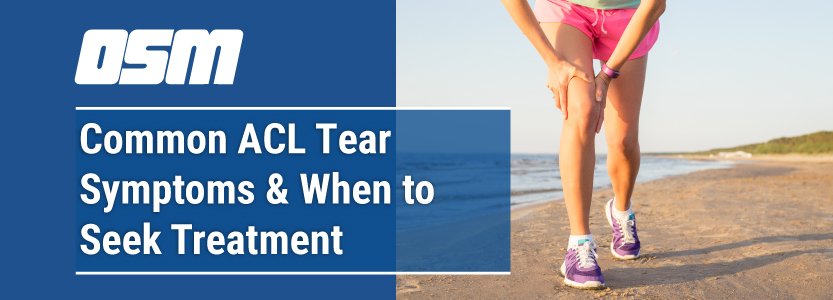Common ACL Tear Symptoms & When to Seek Treatment
Article featured on The Noyes Knee Institute
If you experience pain around your knee area, it is advisable to contact an orthopedic knee surgeon as soon as possible. The pain may stem from a torn anterior cruciate ligament (ACL). Such situations may call for surgery to prevent further damage to your knee joint.
The ACL is one of four ligaments in your knee. It is located behind the patella (kneecap) and connects the thigh bone to the shin bone. The posterior cruciate ligament (PCL), medial collateral ligament (MCL), and lateral collateral ligament (LCL) are the other three ligaments.
ACL Tear Symptoms
ACL stabilizes the knee when you rotate and can get torn when you make sudden stops or changes in direction. Injuries can also result from high-impact sports and maneuvers such as jumping and landing. A torn ACL has many signs, depending on the severity of the injury. Popular symptoms include:
1. Popping Sounds
A loud popping sound is the most common symptom of a torn anterior cruciate ligament. You will hear the popping sound at the moment of injury. Silent pops may also occur when you try to stand or move the knee joint. ACL tears can also result in a painful grinding feeling of your kneecap and bones.
2. Pain and Swelling
A popping sound may indicate other issues but is often a result of torn ACL, especially when accompanied by pain and swelling. The pain is severe at the moment of injury and becomes sharper when you try to get up or put pressure on the knee. In most cases, the pain is quickly accompanied by inflammation/swelling of the knee area.
3. Inability to Bear Weight
You will barely be able to stand a few minutes after an ACL tear. The anterior cruciate ligament is responsible for stabilizing your knee when you move or change directions. Tears in the band of tissue compromise this function, making it difficult to bear your weight or continue with any activity.
4. Lost Range of Motion
ACL tears can result in loss of range of motion, making it impossible to bend, walk, or sprint. Lost range of motion usually stems from excruciating pain. Your knee surgeon will test the range of motion to determine the severity of your pain and injury. Regaining range of motion is also a good sign during ACL tear recovery.
When to Seek Treatment
The knee is one of the most complex joints and harbors ligaments, tendons, tissues, and bones. It is crucial to seek a medical diagnosis immediately if you experience the symptoms of an ACL tear. Proper diagnosis will reveal the scale of injury and determine the best remedy.
Some cases can resolve with rest and rehabilitation. Others require medication, physical therapy, or surgery to remove the damaged parts. Diagnosis involves reviewing your medical history and symptom patterns.
The physician will also conduct a physical examination and may use X-ray scans or request an MRI to assess damage to bones, cartilage, and menisci. After diagnosis, the knee doctor will determine whether you need non-surgical or surgical treatment.
Working With an Orthopedic Knee Surgeon
The first assessment will determine if knee surgery is essential. If such is the recommendation, you should immediately seek an experienced orthopedic knee surgeon. There are various types of surgeries used to treat ACL tears.
The Orthopedic & Sports Medicine Center of Oregon is an award-winning, board-certified orthopedic group located in downtown Portland Oregon. We utilize both surgical and nonsurgical means to treat musculoskeletal trauma, spine diseases, sports injuries, degenerative diseases, infections, tumors and congenital disorders.
Our mission is to return our patients back to pain-free mobility and full strength as quickly and painlessly as possible using both surgical and non-surgical orthopedic procedures.
Our expert physicians provide leading-edge, comprehensive care in the diagnosis and treatment of orthopedic conditions, including total joint replacement and sports medicine. We apply the latest state-of-the-art techniques in order to return our patients to their active lifestyle.
If you’re looking for compassionate, expert orthopedic surgeons in Portland Oregon, contact OSM today.
Phone:
503-224-8399
Address
17355 Lower Boones Ferry Rd Suite 100A
Lake Oswego, OR 97035
Hours
Monday–Friday
8:00am – 4:30pm



